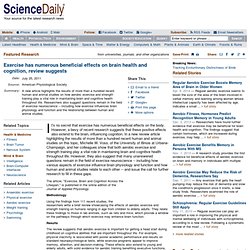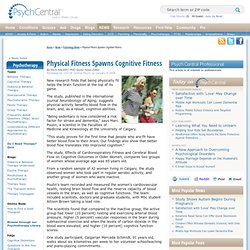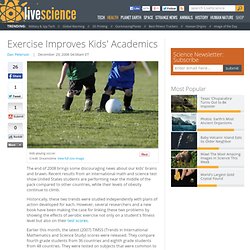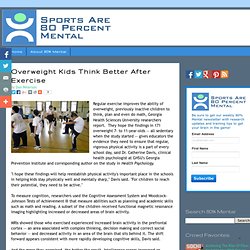

Mother's Exercise May Boost Baby's Brain. Video: A physical education in Naperville. Exercise has numerous beneficial effects on brain health and cognition, review suggests. It's no secret that exercise has numerous beneficial effects on the body.

However, a bevy of recent research suggests that these positive effects also extend to the brain, influencing cognition. In a new review article highlighting the results of more than a hundred recent human and animal studies on this topic, Michelle W. Voss, of the University of Illinois at Urbana-Champaign, and her colleagues show that both aerobic exercise and strength training play a vital role in maintaining brain and cognitive health throughout life. However, they also suggest that many unanswered questions remain in the field of exercise neuroscience -- including how various aspects of exercise influence brain physiology and function and how human and animal studies relate to each other -- and issue the call for further research to fill in these gaps. Feel the burn to feel good, say scientists. Physical Fitness Spawns Cognitive Fitness.
By Rick Nauert PhD Senior News Editor Reviewed by John M.

Grohol, Psy.D. on January 9, 2009 New research finds that being physically fit helps the brain function at the top of its game. The study, published in the international journal Neurobiology of Aging, suggests physical activity benefits blood flow in the brain, and, as a result, cognitive abilities. “Being sedentary is now considered a risk factor for stroke and dementia,” says Marc Poulin, a scientist in the Faculties of Medicine and Kinesiology at the University of Calgary. “This study proves for the first time that people who are fit have better blood flow to their brain.
The study, Effects of Cardiorespiratory Fitness and Cerebral Blood Flow on Cognitive Outcomes in Older Women, compares two groups of women whose average age was 65 years old. How Exercise Could Lead to a Better Brain. The most persuasive evidence comes from several new studies of lab animals living in busy, exciting cages.

It has long been known that so-called “enriched” environments — homes filled with toys and engaging, novel tasks — lead to improvements in the brainpower of lab animals. In most instances, such environmental enrichment also includes a running wheel, because mice and rats generally enjoy running. Until recently, there was little research done to tease out the particular effects of running versus those of playing with new toys or engaging the mind in other ways that don’t increase the heart rate. So, last year a team of researchers led by Justin S. Rhodes, a psychology professor at the Beckman Institute for Advanced Science and Technology at the University of Illinois, gathered four groups of mice and set them into four distinct living arrangements. Exercise on the Brain. Exercise Improves Kids' Academics. The end of 2008 brings some discouraging news about our kids' brains and brawn.

Recent results from an international math and science test show United States students are performing near the middle of the pack compared to other countries, while their levels of obesity continue to climb. Historically, these two trends were studied independently with plans of action developed for each. However, several researchers and a new book have been making the case for linking these two problems by showing the effects of aerobic exercise not only on a student's fitness level but also on their test scores. Earlier this month, the latest (2007) TIMSS (Trends in International Mathematics and Science Study) scores were released.
They compare fourth grade students from 36 countries and eighth grade students from 48 countries. In math, American fourth graders came in at 11th place of the 36 countries while eighth graders scored ninth out of 48. Leaping backward Evidence mounts. Sports Are 80 Percent Mental: Overweight Kids Think Better After Exercise. Regular exercise improves the ability of overweight, previously inactive children to think, plan and even do math, Georgia Health Sciences University researchers report.

They hope the findings in 171 overweight 7- to 11-year-olds -- all sedentary when the study started -- gives educators the evidence they need to ensure that regular, vigorous physical activity is a part of every school day, said Dr. Catherine Davis, clinical health psychologist at GHSU's Georgia Prevention Institute and corresponding author on the study in Health Psychology. "I hope these findings will help reestablish physical activity's important place in the schools in helping kids stay physically well and mentally sharp," Davis said. "For children to reach their potential, they need to be active. " To measure cognition, researchers used the Cognitive Assessment System and Woodcock-Johnson Tests of Achievement III that measure abilities such as planning and academic skills such as math and reading.
Young adults who exercise get higher IQ Scores. Young adults who are fit have a higher IQ and are more likely to go on to university, reveals a major new study carried out at the Sahlgrenska Academy and Sahlgrenska University Hospital.

The results were recently published in the Proceedings of the National Academy of Sciences (PNAS). The study involved 1.2 million Swedish men doing military service who were born between 1950 and 1976. Researchers Studying How Exercise Affects The Brain.